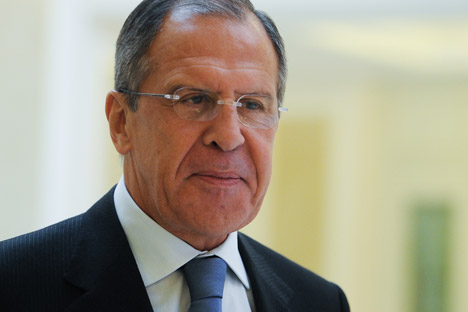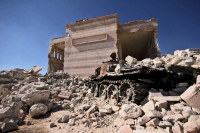Syria and the revival of Al Qaeda

Russian Foreign Minister Sergei Lavrov. Source: ITAR-TASS
Russian Foreign Minister, Sergei Lavrov in a recent interview pointed out possible perilous consequences of attempts of drawing a dividing line between “bad and acceptable” terrorists in the violent conflict in Syria. His comments are particularly apt in the context of Jabhat al-Nusra, an Al Qaeda affiliate, based on the extreme ideology of Salafism.
As Lavrov pointed out this artificial construct may have long term negative consequences not only for Syria but also the Arab world, in which the sectarian conflicts have witnessed increasing proliferation in recent months. Syria itself is a sectarian time bomb, in which Kurds, Alawites (a branch of Shia Islam) and Sunnis are at war. The situation is worsening every day with death toll so far crossing 40,000.
The prospects of chemical gas falling into wrong hands have increased the headache of international players substantially. The Assad regime is under watch for its possible propensity to use these weapons. Lavrov reiterated, “every time we hear rumours or pieces of information come to the surface that the Syrians are doing something with the chemical weapons, we double-check, we triple-check.” These are in a series of comment to ensure that Assad does not use these weapons.
There is, however, no guarantee that an Al Qaeda affiliate would not find ways to steal or capture these deadly weapons particularly nerve agents including mustard gas. After the killing of Osama bin Laden, it was trumpeted worldwide that the dreaded radical organisation has reached the brink of collapse. The organisation’s new leader Ayman al Zawahiri did not have the charisma of Laden. He could not invoke dogmatism among followers as his predecessor had invoked. It was believed in some quarters that the group will gradually be weakened and may wither away into splinter groups with local effects. But, it appears that the much hyped Arab spring has altered the equations and changed the fortunes of this radical organisation.
Whether it is Egypt, the home country of Zawahiri, or Libya, or Syria, Al Qaeda has become successful in reviving itself and decided significantly the course of events these countries would take. In case of Egypt, Zawahiri has developed contacts with Jamal al-Kashef and Sheik Adel Shehato, the leaders of the local Al Qaeda branch, and in case of Syria, one of the leaders of Jabhat al-Nusra, Abu Muhammad al-Julani has contacted Zawahiri in seeking guidance for the movement. The extreme intolerant ideology of Al Qaeda inspired al Nusra has not only led to large scale death and devastation by using weapons supplied by some Arab countries and by the use of suicide bombing, but has also alienated the local elements in the conflict. Interestingly, since March 2011, when the unrest ensued in Syria, the indigenous nature of the conflict has been thwarted by this grouping, and now it appears that the violent movement has largely been hijacked by the Al Qaeda-inspired organisation.
The radical organisation has already announced its future plans such as establishment of an Islamic state in Syria, where Sharia will be the sole governing principle. As one of its members stated, “Our first goal is to get rid of Assad. Then we want a state where the Quran is the only source of law. Sharia is the right path for all humanity – all other laws make people unhappy.” Al-Nusra has become highly intolerant of other groups in the violent conflict. While some local groups involved in the conflict are interested to replace Assad by a democratically elected government, Al Nusra has attempted to marginalise these groups by targeting them, particularly non-Sunnis. Reports suggest that the civil conflict which initially started as a home grown movement has turned to be a bigger battle in which international terrorist networks such as Al Qaeda have staked their interests. These groups have become highly intolerant of other groups and players in the conflict, particularly those who express support to Assad regime. This month al-Nusra declared war against Hezbollah led Lebanon because it supported the Assad regime.
As the weeks go by, the Syrian conflict will like be further murkier. Though Lavrov in his interview expressed optimism that there will be a political way-out to the conflict, the ascendancy of al-Nusra may jeopardise such a prospect. This group is supported by some Sunni Arab states with funding and arms. Though international players involved in the conflict are cognizant of this complicity of some Arab states with this radical grouping, the goal of toppling Assad has apparently led to ostrich eye-like attitude. The conflict in terms of Shia and Sunni, or in terms of subordination of minorities like Kurds by the majority Sunnis, may lead to decades of bloody conflicts in the Arabian landscape even if Assad is toppled.
The question that needs to be asked is not only about democracy in Arab world, but also about secularism and pluralism. Any repudiation of this organisation in words must be followed by stringent policies of banning any supply of arms and funding to it.
Currently, it seems geopolitics and power rivalry and sectarian equations are guiding the Syrian conflict, which in turn have fostered the revival of the dreaded Al Qaeda. As Lavrov pointed out, it is not only for Russia but also for “everyone including our Western colleagues that the biggest threat in this situation is the probability that the rebels might take hold of chemical weapons.” It is but imperative that the regional and international stakeholders to the Syrian conflict must coordinate their policies to checkmate the revival of Al Qaeda and its affiliates. In this venture, the United Nations can play an effective role.
Dr Debidatta Aurobinda Mahapatra is an Indian commentator. His areas of interests include India-Russia relations, conflict and peace, and strategic aspects of Eurasian politics.
All rights reserved by Rossiyskaya Gazeta.
Subscribe
to our newsletter!
Get the week's best stories straight to your inbox
